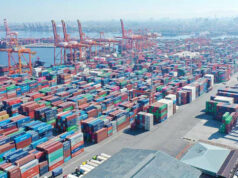THE Energy department needs to clarify how much oil it plans to import from Russia and non-members of the Organization of the Petroleum Exporting Countries (OPEC), a legislator said.
“The quantity being planned for import is not so clear,” Senator Sherwin T. Gatchalian told reporters. “To really make an impact we have to import, in my estimate, at least 30% of the total demand.”
Mr. Gatchalian, who chairs the Senate energy committee, said if the government imports only 1% to 2% of demand, the impact of the added supply might not be felt by consumers.
He said the Department of Energy (DoE) should also provide clarity on the price at which it plans to sell the imported oil, and here it plans to store the shipments.
“It’s not very clear how big the imported quantity will be. Second, where will you stock it. When you import, you have to store it somewhere,” he said, adding: “at what price will it be sold, because the distribution will not be done by the government. On the distribution and retail side, where will you dump it?”
Late last month, the DoE said it was planning to import petroleum products from Russia and other countries that are not members of the OPEC oil cartel. It said the move was meant to “establish a strategic petroleum reserve (SPR) to cushion the impact of the rising price of oil in the international market.”
It also directed an attached agency Philippine National Oil Co.-Exploration Corp. to engage in the selling of petroleum products to independent petroleum dealers and to vulnerable sectors such as public utility transport groups.
Energy Secretary Alfonso G. Cusi later said that imports could start by end-June. He said the department is looking at various areas for the strategic reserve, among them Subic in Zambales province, the Phividec complex in Misamis Oriental, and an unidentified site in Quezon province.
Mr. Gatchalian also questioned whether a foreign oil producer would grant the Philippines a non-market, “concessional” oil price. He said the only way the country can get such a price is from an oil exporter with which the government has “political connection.”
He said the two countries where a political connection exists is China and Russia, but China is a net importer as well.
“How much will Russia sell to us?” he said.
Mr. Gatchalian said a better alternative is similar to a previous initiative called the ”Pantawid Pasada” program during the Arroyo administration where public utility vehicles were given subsidies.
“They should instead adopt a targeted program,” he said, adding that the subsidy should be enough to cover the cost impact of a spike in the price per barrel of imported oil.
He said the measure should be temporary and be in place until such time that oil prices have stabilized. — Victor V. Saulon



